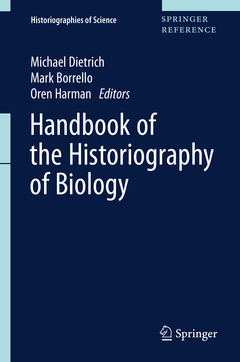Handbook of the Historiography of Biology, 1st ed. 2021 Historiographies of Science Series

This handbookoffers original, critical perspectives on different approaches to the history of biology. This collection is intended to start a new conversation among historians of biology regarding their work, its history, and its future. Historical scholarship does not take place in isolation: As historians create their narratives describing the past, they are in dialogue not only with their sources but with other historians and other narratives. One important task for the historian is to place her narrative in a historiographic lineage. Each author in this collection offers their particular perspective on the historiography of a range of topics from Model Organisms to Eugenics, Molecular Biology to Biotechnology, Women, Race, Scientific Biography, Genetics, Darwin and more. Rather than comprehensive literature reviews, the essays critically reflect upon important historiographic trends, offering pointed appraisals of the field by leading scholars. Other authors willsurely have different perspectives, and this is the beauty and challenge of history-making. The Handbook of the Historiography of Biology presents an opportunity to engage with each other about how the history of biology has been and will be written.
Michael R. Dietrich is Professor and Chair of History and Philosophy of Science at the University of Pittsburgh. He studied Philosophy and Biology at Virginia Tech before earning a doctorate in Philosophy at the University of California, San Diego. As a historian and philosopher of twentieth-century biology, his primary interests are in the nature of scientific controversy. In numerous scholarly articles and chapters, he has explored controversies in evolutionary genetics and molecular evolution, as well as controversial figures, such as the émigré geneticist Richard Goldschmidt. He has coedited several books including Rebels, Mavericks, and Heretics in Biology with Oren Harman (2007), The Educated Eye: Visual Culture and Pedagogy in the Life Sciences with Nancy Anderson (2012), Biology Outside the Box: Boundary Crossers and Innovation in the Life Sciences with Oren Harman (2013), and Dreamers, Visionaries and Revolutionaries in the Life Sciences with Oren Harman (2018). He is currently writing a book on genetic drift with Roberta Millstein and Robert Skipper entitled Survival of the Luckiest: Perspectives on the History and Philosophy of Random Drift in Evolutionary Biology, as well as a biography of Richard Goldschmidt.
Mark E. Borrello, Associate Professor of History of Science in the Department of Ecology, Evolution and Behavior, and Director of the Program in the History of Science and Technology, at the University of Minnesota, studied history and philosophy of science at Indiana University earning a doctorate in 2002. Before coming to the University of Minnesota, he was a visiting assistant professor at the Lyman Briggs School at Michigan State University. As a historian and philosopher of biology, his primary interests are in the development of evolutionary theory in the late-19th and 20th centuries. In numerous scholarly articles
Date de parution : 01-2021
Ouvrage de 538 p.
15.5x23.5 cm
Thèmes de Handbook of the Historiography of Biology :
Mots-clés :
historiography of science; history of biology; history of molecular biology; history of biotechnology; history of genetics; history of evolutionary biology; race and biology; women and biology; history of eugenics; history of developmental biology; Charles Darwin and the Darwinian Tradition; History of Natural History; Ecology and Environmental History; Modern Evolutionary Biology; Gregor Mendel and 19th century Heredity; Modern Genetics and Genomics; Organisms and Traditions of Research; history of biomedicine


